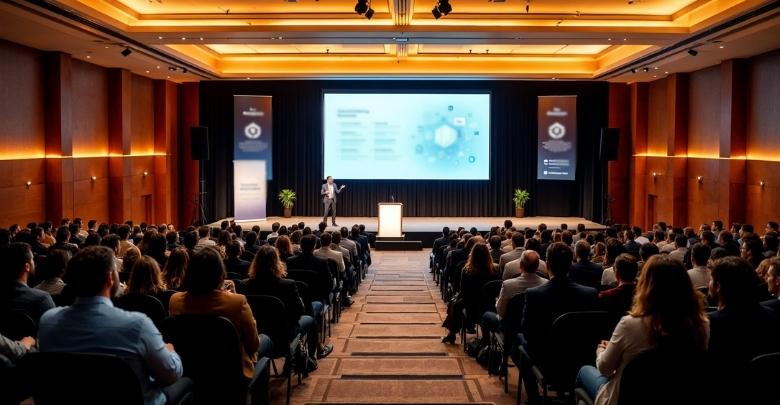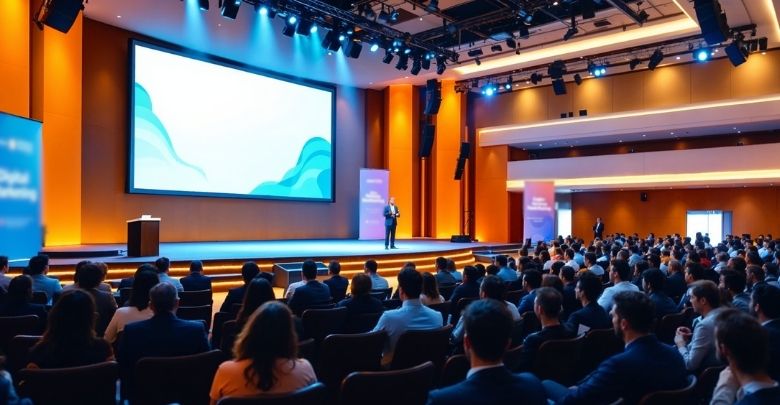Academic conferences bring together scholars, researchers, and professionals to discuss the latest developments in their fields. These events host panel discussions, presentations, and networking sessions, creating a space for sharing knowledge and ideas. If you are interested in attending, you might be wondering how do you get invited to an academic conference.
To get invited to an academic conference, submit an abstract or proposal for a presentation or research paper. Many conferences have open calls for submissions, and acceptance is often based on the quality and relevance of your work. Networking with conference organizers can also increase your chances of being invited.
Are you interested in securing a spot at an academic conference? We cover everything you need to know, whether you’re a student, researcher, or professional. In order to be invited and participate in these valuable academic gatherings, you’ll find all the essential details below.
Find Out How Do You Get Invited to an Academic Conference
Getting an invitation to an academic conference isn’t just about luck; it’s about being proactive. Whether you’re a student, researcher, or professional, securing an invite requires effort. From networking to submitting research, there are many ways to get noticed. Here’s the best strategy to improve your chances of receiving an invitation.
Build a Strong Academic Profile
Developing a solid academic background helps you stand out. Publishing research papers, writing articles, and contributing to academic discussions make you more visible. Organizers often look for participants who actively engage in their field. If you consistently share your work and ideas, you increase your chances of getting invited to present or attend relevant academic events.
Engage with the Academic Community
Active participation in discussions and networking can open doors to invitations. Attending smaller academic events, joining professional groups, and engaging in online forums help build connections. Conference organizers often invite individuals who contribute meaningfully to their field. The more you interact with experts, the higher the chances of receiving an invitation to larger academic gatherings.
Submit Research Papers
Many conferences welcome attendees who contribute to research. If you have a well-structured paper related to the event’s theme, submitting it can improve your chances of getting an invite. Even if your work isn’t selected for presentation, some conferences offer participant invitations to authors, giving you an opportunity to attend and network with professionals.
Participate in University Programs
Universities often have direct links to academic events, and many professors recommend students or researchers for participation. Some institutions even have partnerships that provide access to specific events, including those happening internationally, like a conference in Canada, USA, or any other country. Such opportunities may come through student programs or faculty connections.
Follow Conference Announcements
Staying updated on upcoming events is essential. Many conferences announce open invitations for attendees, speakers, or panelists. Subscribing to academic mailing lists, following professional organizations, and checking university announcements can help. Some events also offer travel grants or sponsorships, making it easier for individuals to secure an invitation and participate.
Join Professional Associations
Becoming a member of academic associations gives you access to exclusive opportunities. Many organizations have conferences where members get priority invitations. These groups also provide networking opportunities with experts and researchers who can introduce you to upcoming academic events. Some associations even offer scholarships or sponsorships for members interested in attending major conferences.
Request an Invitation
If you’re interested in a specific conference, reaching out to the organizers might work. Many conferences allow direct inquiries from potential attendees. Sending a formal email expressing your interest and explaining your academic background can sometimes lead to an invitation. Some events also have application-based attendance, where you can apply to attend as a scholar or industry professional.
Gain Recognition in Your Field
Building a reputation within your academic community increases your chances of receiving invitations. Publishing articles, presenting at small events, and engaging in discussions can help you gain recognition. Organizers often invite individuals who actively contribute to their field. If your work is well-known, you might get invited as a speaker or panelist at relevant conferences.
Stay Active on Academic Platforms
Online academic platforms play a significant role in networking. Keeping your ResearchGate, Google Scholar, or LinkedIn profile updated allows researchers and organizers to find you. Many conference invitations come from these platforms when organizers look for experts in specific topics. Engaging in discussions and sharing insights makes it more likely for you to be considered for an invite.
It takes time to receive an academic conference invitation, but persistent work pays off. Keep engaging with experts, contributing research, and staying updated on opportunities. The more involved you are in your field, the easier it becomes to receive invitations. Stay active, and your academic connections will eventually lead to conference participation.
Why Do Organizers Prefer Attendees With a Strong Research Background?
Not everyone gets invited to an academic conference, and there’s a reason behind it. Organizers look for individuals who bring value to discussions, contribute to research, and add credibility to the event. Let’s explore why having a strong research background increases your chances of being invited.
Enhances the Conference’s Credibility
Conference organizers aim to maintain a high academic standard, which is why they prioritize attendees with a solid research background. Having participants who have published work or contributed to their field makes the event more valuable. Their presence assures other attendees that the discussions will be insightful and academically enriching.
Encourages Meaningful Discussions
A well-researched individual brings more than just attendance—they bring knowledge. Organizers want participants who can engage in discussions, challenge ideas, and contribute new perspectives. Strong research skills allow attendees to ask better questions, share valuable insights, and keep conversations thought-provoking throughout the event.
Increases Engagement in Sessions
Well-informed attendees tend to be more involved in sessions, making panel discussions and Q&A segments more interactive. Organizers know that participants with a research background are more likely to engage actively rather than passively listen. Their contributions help create an intellectually stimulating environment for everyone involved.
Attracts More Sponsorships
Academic events often rely on sponsorships, and having well-researched attendees adds value to the conference. Sponsors prefer supporting events that attract knowledgeable individuals as this increases the credibility of the gathering. Some sponsorships even provide funding options for international conferences, helping researchers attend without financial concerns.
Creates Networking Opportunities
A conference is successful when attendees can connect with like-minded individuals and collaborate on future research. Organizers know that those with strong research backgrounds are more likely to build professional connections. Their ability to contribute to meaningful conversations makes them valuable participants in academic gatherings.
Organizers seek attendees who can add value to an academic conference, and a strong research background makes a difference. Contributing to discussions, engaging in sessions, and bringing credibility to the event all play a role. Keep building your research profile, and invitations will follow.
Why Do Some Conferences Offer Exclusive Invitations to Students?
Not all academic conferences are open to the general public. Some events specifically invite students, giving them a chance to participate in discussions, network with experts, and showcase their work. Knowing why certain conferences prioritize students can help in securing these exclusive invitations.
Encouraging Academic Growth
Many conferences aim to support academic development by inviting students to engage with researchers and industry leaders. Attending these events helps students gain knowledge, present their research, and improve their skills. Organizers understand that giving students access to professional discussions can enhance their academic and career growth.
Bringing Fresh Perspectives
Students often bring new ideas and innovative approaches to research discussions. Many academic events seek to create a dynamic environment by including students in panels, workshops, and Q&A sessions. Their fresh viewpoints can contribute valuable insights, making the conference more engaging and productive for all attendees.
Building Future Academic Leaders
Conferences play a role in shaping the next generation of academics and professionals. Organizers often provide invitation opportunities for graduate students to help them gain early access to networking, collaboration, and mentorship. These invitations allow students to connect with experienced researchers and explore potential career or research paths.
Encouraging Research Participation
Academic events rely on active participation, and students often contribute through research papers, poster presentations, or group discussions. Inviting students encourages them to showcase their work, exchange ideas, and develop confidence in academic settings. Their involvement strengthens the research community and adds depth to conference discussions.
Strengthening University Collaborations
Many conferences have partnerships with universities and research institutions. These collaborations lead to student invitations, allowing them to represent their institutions. Universities also benefit from this arrangement, as student participation helps maintain strong academic connections and increases institutional recognition in academic and professional circles.
Exclusive conference invitations for students provide valuable learning and networking opportunities. Organizers prioritize student participation to encourage research engagement, build future academic leaders, and strengthen collaborations. By staying informed and actively contributing to research, students can increase their chances of receiving these invitations.
Common Myths About Academic Conference Invitations
Receiving an invitation to an academic conference can feel exciting, but there are many misconceptions surrounding the process. Some people assume certain requirements, while others misunderstand how invitations work. Let’s clear up some common myths and set the facts straight.
Only Experts Get Invited
Many believe that only established researchers or senior academics receive invitations. In reality, conferences welcome participants at all career stages. Whether you are a student, early-career researcher, or professional, if your work is relevant to the conference theme, you have a fair chance of receiving an invitation.
Invitation Means Guaranteed Participation
Some assume that receiving an invitation automatically secures their participation. However, most conferences require further steps, such as submitting an abstract, completing registration, and paying fees. Ignoring these steps could result in losing the opportunity to attend, so following the guidelines is always necessary.
Invitations Are Only for Presenters
It’s often thought that only those presenting research can receive an invitation. While presenters are a primary focus, many conferences also invite attendees for networking, discussions, and learning opportunities. Even if you’re not presenting, you can still attend and benefit from engaging with experts in the field.
Paid Invitations Are Always Scams
Seeing a conference with a registration fee doesn’t necessarily mean it’s a scam. Many legitimate academic events require payments to cover costs like venue, materials, and speaker arrangements. However, it’s always wise to research the conference, check its credibility, and verify its organizers before making any payments.
Popular Conferences Don’t Require Invitations
Some think that well-known conferences are open to everyone without invitation requirements. While some events allow general registration, many prestigious ones still require formal invitations or approval based on applications. Checking the participation criteria for each conference helps avoid confusion about the process.
Knowing the reality behind conference invitations helps you make informed decisions. By knowing what to expect, you can confidently apply, register, and participate without falling for common misconceptions. Always verify information and follow the required steps to secure your spot successfully.
What Are the Challenges of Attending an Academic Conference Abroad?
Attending an academic conference in another country can be an exciting opportunity, but it also comes with challenges. From travel arrangements to financial concerns, several factors need careful planning. Knowing these difficulties in advance can help make the process smoother and more manageable.
Managing Travel Costs
One of the biggest challenges of attending an international conference is the financial burden. Flights, accommodation, and daily expenses add up quickly. Many students seek funding options for international conferences to reduce costs, as universities and organizations sometimes offer grants or sponsorships to support academic travel.
Visa and Documentation Issues
Securing a visa can be a complicated process, especially when dealing with different country requirements. Many conferences require attendees to apply for visas months in advance, and any missing documents can delay or even prevent participation. Careful preparation and early applications help avoid last-minute issues.
Adjusting to Cultural Differences
Every country has its own customs and ways of communicating, which can feel unfamiliar. Knowing local etiquette, language basics, and conference norms helps in adapting quickly. Being aware of these differences ensures a more comfortable experience and allows participants to engage confidently with international researchers.
Handling Travel Fatigue
Long-distance travel can be exhausting, especially with time zone changes and packed schedules. Arriving early before the event can help you adjust to the new time zone. Proper rest and planning also ensure that participants stay focused and make the most out of the conference.
Balancing Academic and Personal Responsibilities
Leaving for an international conference often means stepping away from academic coursework, research, or teaching duties. Planning ahead by notifying professors or supervisors and managing deadlines before traveling can prevent falling behind. Staying organized makes it easier to handle both conference participation and academic commitments.
Attending an academic conference abroad requires preparation, time, and effort. While challenges exist, careful planning can make the experience smoother. By understanding these obstacles and finding solutions in advance, participants can focus on learning, networking, and making the most of their international conference experience.
FAQs About How Do You Get Invited to an Academic Conference?
Securing an invitation to an academic conference can be a complex process, especially for those unfamiliar with how it works. Many graduate students and researchers wonder what steps to take, what organizers look for, and how they can improve their chances. Below are some frequently asked questions with detailed answers to guide you through the process.
Do Conferences Invite Students Who Are Not in PhD Programs?
Many conferences welcome graduate students at different academic levels, not just PhD candidates. Master’s students, research assistants, and even undergraduates with strong academic backgrounds can receive invitations. The key is to demonstrate interest in the conference theme and show how your academic work aligns with the event.
How Do I Know If a Conference Is Accepting Applications?
Most conferences announce participation details months in advance on their official websites, academic mailing lists, and social media. Checking university bulletin boards, research groups, and professional associations can help you stay updated. Subscribing to newsletters and following event organizers can also keep you informed about open invitations.
Can I Request an Invitation if I Have Never Attended a Conference Before?
Yes, many conferences allow first-time attendees to request invitations. When making a request, highlight your academic background, research interests, and reasons for wanting to attend. Some organizers prefer fresh voices in discussions, and demonstrating enthusiasm for the event can work in your favor.
Are Conference Invitations Based on Academic Merit Alone?
While academic merit plays a role, it’s not the only factor. Organizers also consider networking potential, professional recommendations, and relevance to the conference theme. Being active in research communities, engaging in academic discussions, and showing a strong interest in the event can improve your chances of getting invited.
Can Social Media Activity Help Me Get Invited?
Maintaining an active academic presence on platforms like LinkedIn and ResearchGate can increase visibility. Conference organizers often search for researchers who actively contribute to discussions, share their work, or engage with experts in their field. A well-maintained professional profile can sometimes attract invitations to relevant conferences.
Do Online Conferences Also Require Invitations?
Yes, many virtual academic conferences require formal invitations, especially for presenters and panelists. However, some online events allow general registration without invitation requirements. Checking the conference’s participation guidelines will help determine whether an application or nomination process is necessary for attending.
What Should I Include in My Invitation Request Email?
A formal invitation request should include your academic background, research interests, and reasons for attending. If you have a professor’s recommendation or relevant experience, mentioning these can strengthen your request. Keeping the email professional, concise, and well-structured improves your chances of receiving a positive response.
Can Attending Smaller Conferences Help Me Get Invited to Bigger Ones?
Yes, participating in smaller academic events can enhance your profile and credibility. Conference organizers often look for attendees who have prior experience in similar events. Building a record of past participation in university-level or regional conferences can lead to invitations for larger, more prestigious conferences.
How Do I Increase My Chances of Being a Speaker at a Conference?
To become a speaker, submitting well-researched papers, engaging with conference organizers, and demonstrating expertise in your field are key. Attending related conferences, publishing work, and networking with professionals can also help. Some events offer speaker application programs, so keeping track of deadlines and submission requirements is essential.
End Note
Securing an invitation to an academic conference can be a valuable experience. From publishing research to networking with experts, you can increase your chances. It will be easier to find the right conference if you stay informed about conference opportunities.
If you’re wondering how do you get invited to an academic conference?, the answer lies in building a strong academic profile, submitting research papers, and engaging with professional communities. Many conferences welcome participants based on merit, networking, or direct invitation requests, so staying active in your field increases your chances of receiving an invitation.
Apply early, follow conference announcements, maintain a professional academic presence, and seek recommendations. Join academic groups and keep learning. Stay committed to your research, and opportunities will come your way. Good luck at your future conference!








